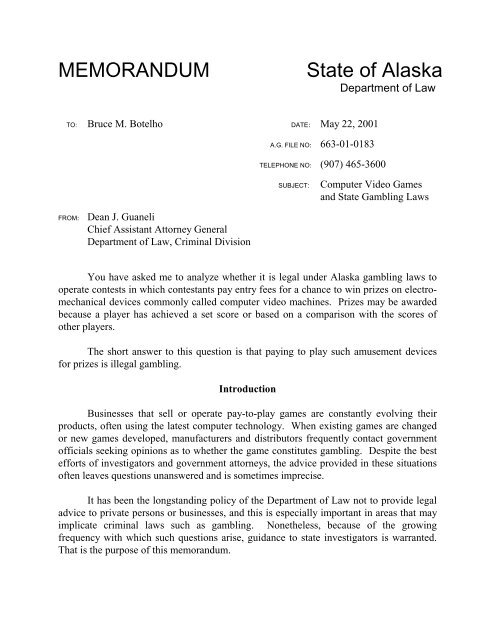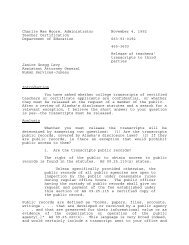Computer Video Games and State Gambling Laws - Alaska ...
Computer Video Games and State Gambling Laws - Alaska ...
Computer Video Games and State Gambling Laws - Alaska ...
Create successful ePaper yourself
Turn your PDF publications into a flip-book with our unique Google optimized e-Paper software.
Bruce M. Botelho, Attorney General May 22, 2001A.G. file no: 663-01-0183 Page 3amusement device, i.e., an immediate right of replay conferred by the device, if the rightof replay cannot be exchanged or cancelled. See AS 11.66.280(2)(B).Although an earlier informal Attorney General's opinion took a different position,we believe that “entertainment value” inherent in playing a game is not dependent on theoutcome of the game, <strong>and</strong> thus does not fit within the concept of a prize under <strong>Alaska</strong>law. The definition of “something of value” clearly includes “entertainment.”AS 11.66.280. But the mere fact that entertainment has value does not mean that it is aprize for winning a contest of chance.<strong>Games</strong> are, by definition, pastimes that are usually amusing, enjoyable, orentertaining. Entertainment occurs simply by virtue of playing the game, win, lose, ordraw. Although players no doubt derive more pleasure from winning than from losing,the entertainment value of the game does not necessarily depend on any particularoutcome. Indeed, there is entertainment derived even when the player stops before thegame is completed.As previously discussed, gambling under <strong>Alaska</strong> law requires that the prize bereceived based on the “outcome” of a contest of chance. AS 11.66.280. Thus, when theonly thing that the player derives from the game is its entertainment value (as distinctfrom winning a free replay), there is no gambling because the entertainment occursregardless of the outcome. The contrary conclusion expressed in the earlier opinion ishereby expressly overruled. 2As a final point on the concept of prize, <strong>and</strong> as a guide to investigators, we believethat a prudent enforcement policy would permit contests when the only prize to beawarded for playing a game (even a game of chance) is something that has no exchangevalue <strong>and</strong> modest intrinsic value <strong>and</strong> is traditionally given to identify the player as aparticipant or winner, such as a certificate, t-shirt, plaque, or trophy.2This opinion overrules 1995 Inf. Op. Att’y Gen. (Nov. 15; 663-96-0152) to the extent thatthe 1995 opinion concluded that the entertainment value of games is something of value thatbrings the game within the definition of “gambling” in AS 11.66.280. We express no view onany other conclusions in the 1995 opinion.
Bruce M. Botelho, Attorney General May 22, 2001A.G. file no: 663-01-0183 Page 43. Chance vs. SkillThe final element in determining whether an activity constitutes illegal gamblingturns on the concepts of skill <strong>and</strong> chance. As noted previously, gambling requires acontest of chance 3 or a future contingent event. 4Old <strong>Alaska</strong> case law held that illegal gambling occurred “where chance dominatesthe distribution of prizes even though such a distribution is affected to some degree by theexercise of skill or judgment.” Morrow v. <strong>State</strong>, 511 P.2d 127 (<strong>Alaska</strong> 1973). In otherwords, the court held that for an activity to be considered gambling, chance must be thedominant factor, even if skill is material.But in 1978 the <strong>Alaska</strong> Legislature specifically rejected the court’s formulation inMorrow <strong>and</strong> actually reversed the factors so that gambling occurs even if skill is thedominant factor, as long as chance is a material element. Senate Journal Supp. No. 47, at112-14 (June 12, 1978). The <strong>Alaska</strong> Legislature adopted the commentary of the NewYork legislature, in noting that “despite the importance of skill in any game, [gamblingoccurs if] the outcome depends in a material degree upon an element of chance.” Id.There seems to be little doubt that computerized games which attempt to reproducetraditional gambling (such as video poker or video slot machines) have chance as thedominant factor in their operation. These games rely on computerized number generators<strong>and</strong> statistical software to reproduce the r<strong>and</strong>omness of the real games, or to manipulatethe odds of a particular outcome occurring. Thus the machine itself controls the outcome,with the player being left with little control over the outcome other than to select theamount of the bet <strong>and</strong> to take or discard cards (as in video poker or blackjack) in anattempt to improve the odds of winning. Therefore, in computer games that involve theturn of a playing card, the roll of the dice, the spin of a wheel, or the drawing of lots,chance is clearly material <strong>and</strong> predominant, even though skill is obviously involved incalculating the odds of winning. In other devices, however, the element of skill may verywell be the predominant factor, but chance may nonetheless still be material.3A “contest of chance” is defined in AS 11.66.280(1) to include any game or contest “inwhich the outcome depends in a material degree upon an element of chance, notwithst<strong>and</strong>ing thatthe skill of the contestant may also be a factor.”4“Future contingent event” is not defined, but would include any occurrence that is “notunder the person’s control or influence.” AS 11.66.280(2).
Bruce M. Botelho, Attorney General May 22, 2001A.G. file no: 663-01-0183 Page 5It ordinarily requires a detailed underst<strong>and</strong>ing of the inner-workings of gamingdevices <strong>and</strong> the mathematical algorithms that control them to determine the precisemanner in which the machine operates. These other computer games often use videoimages to portray car races, baseball games, golf matches or other sporting events, orscience fiction or fantasy scenarios involving combat, adventure, or manipulation ofvideo images. These computerized devices usually depend on sophisticated software thatattempts to visually <strong>and</strong> aurally entertain the player, <strong>and</strong> in some cases to represent <strong>and</strong>display the sense of a real-life event.Electro-mechanical game devices come in a seemingly unlimited <strong>and</strong> constantlyevolving variety. All have some type of system of player h<strong>and</strong> <strong>and</strong>/or foot mechanisms,often a wheel, button, stick or pedal, or a combination of these. In a typical device, theplayer attempts to achieve a certain score by manipulating the mechanisms. In classicpinball-type machines, the player attempts to directly control moving metal balls. But invideo games there is commonly a computer-controlled video screen to display movement,rather than actually moving physical objects like balls. The h<strong>and</strong> <strong>and</strong> foot mechanismschange the player’s movements into electronic signals that are sent to a processing devicethat interprets the inputs using computer software <strong>and</strong> translates the inputs onto a visualdisplay.The typical computer game also calculates a score for the player. The score isusually in points, elapsed time, or number of attempts taken. With computer devices, thescore awarded to the player is often displayed <strong>and</strong> compared with the scores of otherplayers. With some modern games, such as the golf game described below, devices in onelocation can be linked electronically to devices in different locations anywhere in thecountry, so that scores in multiple locations can be compared.The particular device that prompted this inquiry is a computer video game basedon the game of golf. 5 Although this golf game is the only video machine discussed in thismemor<strong>and</strong>um, we believe that it provides a good basis for analyzing issues that arecommon to all types of similar machines. Therefore, the opinions expressed today applyto all types of computer video games.5The game displays the movement of a golf ball on a selected golf course, based on inputsfrom the player, who is given several variables <strong>and</strong> settings to choose from. For example, theplayer is told the distance to the hole, layout of the fairways <strong>and</strong> traps, wind speed, course terrain<strong>and</strong> slope of the green. Using buttons <strong>and</strong> a “trackball” input, the player can provide direction of“swing,” selection of one of 14 “clubs,” amount of “back swing,” forward club “speed,” the“type” of swing (i.e., hook, slice, etc.), club “angle,” <strong>and</strong> whether there is “back spin.”
Bruce M. Botelho, Attorney General May 22, 2001A.G. file no: 663-01-0183 Page 6The attorney for the manufacturer of the golf video game has provided us with astatistical analysis, prepared by a gaming expert retained by the manufacturer, showingthat a player can improve his or her score with repeated playing of the device, <strong>and</strong> thatskilled players consistently beat the scores of players of lesser skill. The gaming experthas also submitted a testing report that asserts that a particular selection of inputsconsistently causes the same result on the video screen under the same circumstances. Themanufacturer thus claims that the outcome of the game is dependent solely on the skill ofthe player <strong>and</strong> is not dependent on chance in any degree. 6Although the 1978 revision of the criminal code changed the relative importanceof skill <strong>and</strong> chance in connection with the statutory definition of gambling, earlier <strong>Alaska</strong>case law is nonetheless relevant in analyzing concepts of skill <strong>and</strong> chance. In 1965 the<strong>Alaska</strong> Supreme Court analyzed the elements of skill <strong>and</strong> chance in a pinball machine. Inthat game, not unlike a game of golf, the player would try to guide balls to certain holes.The lower court had found, <strong>and</strong> the supreme court conceded, that skill was important. Asthe supreme court observed,To say that a skilled player would have a better opportunity than anunskilled player to win...is not the same as saying that the skilledplayer's operation of the machine will certainly result in a fixed[prize] each time he shoots his quota of balls.<strong>State</strong> v. Pinball Machines, 404 P.2d 923, 926 (<strong>Alaska</strong> 1965). Accord, People v.Turner, 629 N.Y.S.2d 661 (Crim. Ct. N.Y. 1995) ("The skill of the player may increasethe odds in the player's favor, but cannot determine the outcome regardless of the skillemployed.")There is little question that a person can improve their score on computer gamingdevices with repeated practice. This does not necessarily lead to the conclusion thatchance is not material in winning a prize, or that the skill needed to play the game will berecognized as a legitimate factor in exempting the game from state gambling laws.6The video golf device does introduce a degree of r<strong>and</strong>omness in presenting video“obstacles,” such as occasional wildlife <strong>and</strong> spectators, <strong>and</strong> changing weather conditions. Suchcomputer-generated factors can, however, be controlled by the manufacturer, <strong>and</strong> made uniform<strong>and</strong> consistent for all players. The manufacturer of the golf game asserts that the r<strong>and</strong>om changesin course conditions are in fact controlled in situations in which prizes are awarded. Our analysisdoes not, therefore, turn on the existence of computer-generated changes if such factors arecontrolled.
Bruce M. Botelho, Attorney General May 22, 2001A.G. file no: 663-01-0183 Page 7The <strong>Alaska</strong> Supreme Court in Morrow v. <strong>State</strong> set out four factors for courts toconsider to determine whether skill will be recognized as a legitimate factor in a contest.One of these factors (that the winner of the contest must be determined objectively),appears to be met by most video games that calculate points, elapsed time, or some othertype of objectively based score. Another Morrow factor is whether skill controls eachpart of the contest. Assuming skill is recognized as a legitimate factor, it appears to benecessary in each phase of playing the golf game, <strong>and</strong> perhaps other video games. 511P.2d at 129-30. However, as discussed above, while skill certainly affects the playing ofthe game, there are other factors that determine whether a participant wins a prize.As discussed below, two of the Morrow factors could lead to a conclusion thatsome computer video games available to the public are so complex or winning a prizerequires such a high level of skill that it is gambling for the average player to pay for thechance to play the game to win a prize.In Morrow, the supreme court said that in a contest in which skill will be held topredominate, participants "must have sufficient data upon which to calculate an informedjudgment," presumably about whether they have sufficient skill to enter or to continueplaying in the contest. Id. at 129. It could be argued that such data for informed consentdoes not exist in computerized devices governed by complicated internal mechanisms thatare inaccessible <strong>and</strong> essentially unknown to the player <strong>and</strong> ordinarily completely hiddenfrom him. We believe that it will be extraordinarily difficult if not impossible for a playerto gain sufficient knowledge about the software or hardware in a computer gaming deviceto be able to determine the manner or degree to which r<strong>and</strong>omness or mathematical orstatistical patterns affect its operation. In other words, the player has no way of knowingthe precise methodology of the mechanism being played. Moreover, informed consentmay be lacking if as a practical matter the player does not have complete informationabout other players against whom he is competing. 7Another factor noted by the supreme court in Morrow is that the general class ofparticipants must possess the necessary skill to be able to win. For example, "[w]here thecontest is aimed at the capacity of the general public, the average person must possess theskill . . . ." Id. Even where there is an attempt to warn the participants that a high level ofproficiency <strong>and</strong> experience is needed to succeed in the contest, that may not be enough.<strong>Computer</strong> video games are ubiquitous. Nowadays most children grow up playing many7On the other h<strong>and</strong>, it could also be argued by the manufacturer of a game that the playershave adequate opportunity to practice the game before they enter a contest, <strong>and</strong> that they canobtain information about the competition if the machine provides a display of the top scores.
Bruce M. Botelho, Attorney General May 22, 2001A.G. file no: 663-01-0183 Page 8such games, <strong>and</strong> they are popular pastimes especially among teenagers <strong>and</strong> young adults.The chance to win large cash prizes by playing one of these computer video machineswill be very enticing to many people, regardless of warnings about the level of aptitudeneeded. In Morrow, the supreme court warned that "[t]he scheme cannot be limited oraimed at a specific skill which only a few possess." Id. If so, then as a practical matterthe average player that may be enticed into entering the contest has little or no opportunityto win, <strong>and</strong> playing the game may be considered gambling. As the supreme court noted,what is critical is "the capacity of the general public -- not experts . . . ." Id.Based on the supreme court's discussion of skill in Morrow, it is at least open toquestion whether the skill needed to play the golf machine will be recognized as alegitimate factor. Even if skill is recognized as a legitimate factor, it may not suffice totake the machine outside the ambit of state gambling laws.In Morrow <strong>and</strong> Pinball Machines the supreme court looked carefully at the degreeof control that the player could exercise over the outcome of the contest. The legislaturehas also found that control is an important factor, as is shown in its discussion of thedifference between persons playing against each other <strong>and</strong> persons who merely observeanother playing.The <strong>Alaska</strong> Legislature made it clear that “<strong>Games</strong> of pure skill, e.g., chess, will notbe considered gambling if the contestants bet against each other.” Senate Journal Supp.No. 47, at 112-14 (June 12, 1978). By contrast, although betting between chess players(i.e., those in control of the outcome) is not gambling, betting by onlookers is gambling.The reason for this, the legislature determined, was that “from the onlooker’s perspective,the outcome depends on ‘chance’ as he has no control over the outcome.” Id. Thelegislature thus recognized that the player's control over the outcome of a contest is acritical element. 88Players of video games are mere onlookers of the games of other players, <strong>and</strong> thus havediminished control over the outcome. In a game of chess, the participants play against eachother. In such games, the outcome is solely within the control of the players, because the way inwhich a person plays chess affects the way the opponent plays, <strong>and</strong> thus controls the outcome.Although there may be factors outside of the player’s control, such as distractions, lightingconditions, or other environmental factors, such conditions apply to each of the contestants moreor less equally. Importantly, each chess player is not merely a passive onlooker in the other'sgame. The movements of one player affect <strong>and</strong> often dictate the movements of the other. Invideo games, however, the participants may be playing the game with each other, but they are notplaying against each other. For example, in a typical video game, one person plays the game at a(continued...)
Bruce M. Botelho, Attorney General May 22, 2001A.G. file no: 663-01-0183 Page 9As previously discussed, computer games are complicated devices, the preciseoperation of which the player has no significant knowledge. In addition, such devicesrequire periodic maintenance or can be internally or externally adjusted in ways that mayaffect the outcome of play. 9 Players are usually unaware of how such maintenance (orlack of maintenance) or adjustments could affect play on any given occasion. Thus, theplayer lacks significant control over the device that is being played.In addition, when multiple participants are playing more than one device, <strong>and</strong>especially when devices are electronically linked in multiple locations, there isuncertainty about the adjustments of the various devices <strong>and</strong> the comparability of scores.Thus, the player lacks significant knowledge about, <strong>and</strong> has no control over, theconditions under which opponents are playing.Moreover, when devices are linked in multiple locations, there is the additionaluncertainty about the identity of opponents. Players thus lack significant informationupon which to base a decision whether to continue paying to play in a particular contest.In Pinball Machines, the supreme court conceded that a skillful player was morelikely to win. However, under the facts described by the court, the player could notcontrol how much was won, because that was controlled by the machine. "The element ofchance is present, because the outcome -- the number of free games that one may win -- isnot a certain thing." 404 P.2d at 925.8 (...continued)time, <strong>and</strong> the scores obtained by each player are usually not dependent on how well the otherperson plays. In other words, each participant is in essence an onlooker while the other personplays. This is particularly true in the golf video game. Although participants can play in a"foursome," when each player takes his or her turn the other players in the foursome may beinvolved in other activities or simply observing. Each player is thus a mere onlooker while theothers play. As the legislature observed, “from the onlooker’s perspective, the outcome dependson ‘chance’ as he has no control over the outcome.” As discussed in the remainder of thisopinion, however, even in video games that might directly pit one player against another player,or in which a player attempts to achieve a set score to win a prize, the outcome of a game may bedetermined by events or mechanisms over which the player has little or no control.9According to information provided by the manufacturer of the video golf game, theowners are obligated to report to the manufacturer unspecified “software errors” that canobviously affect the operation of these computer-driven games. The manufacturer also advertises“remote operator controlled game adjustments,” in which the owner can “Make equipmentadjustments without ever leaving their office.” “Machine diagnostics” are also available for“Early detection of equipment problems.”
Bruce M. Botelho, Attorney General May 22, 2001A.G. file no: 663-01-0183 Page 10Despite the fact that skill was important in playing the pinball game, <strong>and</strong> that askillful player was more likely to win, the fact that the player could not guarantee theamount of the prize was enough for the court to determine that chance predominated, <strong>and</strong>that playing the pinball machine was gambling. As the supreme court recognized inPinball Machines, if "there is uncertainty, there is chance." Id. at 926 (footnote omitted).Under Pinball Machines, the acknowledged skill needed to play the game did notprevent a finding that chance predominated because it could not be said that "the player'soperation of the machine will certainly result" in a prize each time the game was played.404 P.2d at 926. If skill was not predominant in the pinball machine because it would notresult in a prize each time the game was played, then that result seems to apply equally tothe golf machine. Arguably, if skill is not predominant, then chance must be at leastmaterial. If chance is material, then paying to play for the opportunity to win a prize isgambling. 10With the golf machine, no player is guaranteed a prize. Indeed, the odds ofwinning a prize depend on both the player's experience <strong>and</strong> the number <strong>and</strong> experience ofother players who are also competing, perhaps in another city or another state. Althoughskill is important in a player achieving a high score, the scores achieved by all otherplayers is a result that is completely out of the control of any particular player <strong>and</strong> not inany way dependent on that player's skill. Thus, although playing the golf machine well isdependent on skill, winning a prize depends on other factors <strong>and</strong>, indeed, on a materialelement of chance.Notwithst<strong>and</strong>ing that the skill of the participants may be the predominant factor inachieving a high score on computer video machines, we are of the opinion that thecomplex, adjustable, or inter-connected nature of these devices, <strong>and</strong> lack of player controlover the outcome, creates a material degree of uncertainty <strong>and</strong> chance as to whether theplayer will win a prize, which brings these devices within the ambit of <strong>Alaska</strong> gamblinglaws. 1110 The discussion of skill <strong>and</strong> chance in this memor<strong>and</strong>um effectively overrules a 1984opinion to the extent the opinion suggests that betting by participants in an athletic event is notgambling. 1984 Op. Att’y Gen. (Dec. 4; 366-248-85).11The attorney representing the distributor of the video golf game provided a two-pageletter from an assistant prosecutor to the police in Maui County in Hawaii, expressing the opinionthat the golf video game discussed in this memor<strong>and</strong>um was not gambling under Hawaii law.The definition of "contest of chance" in Hawaii law is almost identical to <strong>Alaska</strong>'s, but the letter(continued...)
Bruce M. Botelho, Attorney General May 22, 2001A.G. file no: 663-01-0183 Page 114. Electronic <strong>Games</strong> Are Amusement Devices Under <strong>Alaska</strong> LawWe have concluded that electronic video machines are included under <strong>Alaska</strong>gambling laws if fees are paid for the chance to win prizes for playing the devices. Thisconclusion provides consistency in the law, because it treats video games the same asclassic amusement devices, such as pinball machines.A pinball machine is a device that has existed for decades. Through use of aspring-loaded plunger, the player propels metal balls toward a slanting surface with pins,holes, targets, <strong>and</strong> other mechanisms that tally points <strong>and</strong> move the balls. Throughmanipulation of button- or lever-controlled paddles, the player attempts to achieve ahigher score.11(…continued)contains no discussion of the history or case law of gambling in Hawaii. There appears to belittle other legal authority from other jurisdictions that is directly on point because the laws ofmost states are different than <strong>Alaska</strong>'s. For example, earlier this year the Louisiana AttorneyGeneral's Office wrote an opinion in which the precise golf video game discussed in thismemor<strong>and</strong>um was declared to be a "gambling device." (Op. No. 00-478, Jan. 21, 2001; 2001WL 129279(La.A.G.)) However, Louisiana law contains statutory definitions that are differentthan in <strong>Alaska</strong>. Over twenty years ago a county court in New York declared several differentvideo games to be games of skill, <strong>and</strong> therefore not gambling, but did so under a local ordinancethat is different than <strong>Alaska</strong>'s in that it required that chance predominate in a game in order to beconsidered gambling. WNEK Vending <strong>and</strong> Amusement Co., Inc. v. City of Buffalo, 434 N.Y.S.2d608, 616 (Sup. Ct. 1980) (partially overruled 506 N.Y.S.2d 856 (1986)). In Iowa, the legislaturelast year amended its gambling laws to specifically allow the video golf game discussed in thismemor<strong>and</strong>um. In the packet of materials provided by the attorney for the manufacturer of thegolf video game, there are statements in a newsletter from the manufacturer that the Iowastatutory change was due to the efforts of one of their distributors, <strong>and</strong> that without those effortsthe bill would not have passed. The Iowa law now specifically exemptsIowa Code 99B.11(2e).A video machine golf tournament game which is an interactive bona fidecontest. A player operates a video machine golf tournament game with atrackball assembly which acts as the golfer's swing <strong>and</strong> determines theresults of play <strong>and</strong> tournament scores. A video machine golf tournamentgame is capable of receiving program <strong>and</strong> data information from an offsitelocation. A tournament operator shall prominently display alltournament rules.
Bruce M. Botelho, Attorney General May 22, 2001A.G. file no: 663-01-0183 Page 12Pinball machines allow the player significant control over the initial speed of theball <strong>and</strong> the subsequent movements of the ball. Pinball machines also allow the player todirectly observe the actual movement of the ball, as contrasted with an electronicallysimulated movement on a computer-controlled video screen. It seems apparent that apinball player requires at least an equivalent amount of skill as someone who plays avideo game. Moreover, a pinball player has as much if not more control or influence overthe game.Yet despite the acknowledged skill required to play pinball machines <strong>and</strong> despitethe player’s apparent control over the outcome, the <strong>Alaska</strong> Legislature made it clear thatpinball machines are amusement devices that involve illegal gambling if anything ofvalue (other than a free replay conferred by the machine) is awarded to the player. SeeAS 11.66.280(2)(B) <strong>and</strong> commentary in Senate Journal Supp. 47, at 112-14 (June 12,1978). We believe that there is no meaningful way to distinguish pinball machines fromtheir modern counterparts: computer video machines.Therefore, although the criminal code contains no definition of “amusementdevice,” we believe that the term easily encompasses computer video games. If a playerpays a fee to play such a machine, the only prize that can be awarded is a free replayunder the terms of AS 11.66.280(2)(B).Please contact me if you have questions. 1212In the course of preparing this memor<strong>and</strong>um, a question arose as to whether, if we areincorrect in concluding that prize-based video games constitute gambling, such activities wouldrequire a permit under AS 05.15. In other words, if paying for the chance to win a prize on avideo machine is not a “contest of chance” under AS 11.66.280, is it then a “contest of skill”requiring a permit under AS 05.15? Under <strong>Alaska</strong> gaming laws a “contest of skill” is a contestor game “in which prizes are awarded for the demonstration of human skills in marksmanship,races, <strong>and</strong> other athletic events.” See AS 05.15.690(7). The issue is whether playing certaintypes of video machines would be considered a "race" or “athletic event,” or could involve“marksmanship.” (Although the word “marksman” is often associated with shooting, onedictionary definition notes that it especially applies to “a person skillful or practiced in hitting amark or target.” Webster's Ninth New Collegiate Dictionary (1990)). It is beyond the scope ofthis memor<strong>and</strong>um to decide these issues.
















